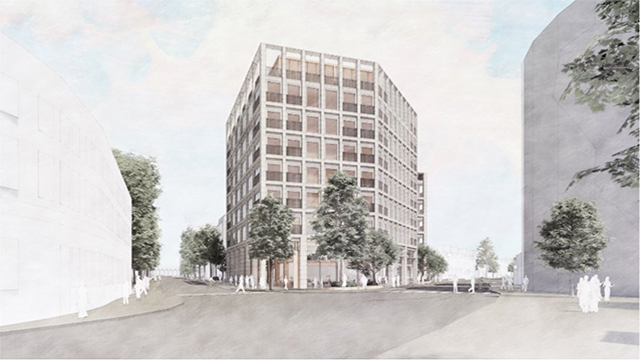As the exact terms of the UK’s departure from the EU continues to cause consternation in parliament and across the country, a trial has begun over whether Brexit constitutes a very different – and specific – form of frustration.
The High Court is being asked to decide whether Brexit triggers the rarely used legal doctrine of “frustration” in the case of the European Medicines Agency (EMA) and its £13m-a-year lease of premises at Canary Wharf, which runs until 2039, with no break clause.
If judge Mr Justice Marcus Smith decides that Brexit is a “frustrating event”, it would mean that the EMA could walk free of the lease of its premises at Churchill Place, E14 – and could set a massive precedent for other tenants to make similar claims.
Canary Wharf has brought the case to court, seeking a declaration that Brexit does not amount to a frustration of the lease. The EMA is itself seeking a declaration that it does.
Opening the case today, Joanne Wicks QC, representing Canary Wharf, said: “Whilst parliament continues to determine what Brexit means, it is for the courts to determine its legal effects.”
She said that the question to be decided is whether the UK’s decision to leave the EU is a matter that “fundamentally and radically changes” the performance of the contract between Canary Wharf and the EMA, such that the EMA “is released from its obligations”.
Cost to Canary Wharf

If the EMA wins the case, it would cost Canary Wharf millions of pounds, the group’s chief executive and chairman Sir George Iacobescu told the court today while under cross-examination from the EMA’s legal team.
“The result of EMA coming out of the lease would be a loss of £264 million,” he said.
The group might look for new tenants, but that wouldn’t happen immediately, he said, “so the reality of life is immediately we lose £264 million”.
The key battleground between the parties is over the question of whether Brexit was “foreseen” or “foreseeable” back in 2011 when they entered an agreement for lease of the premises.
Jonathan Seitler QC, for the EMA, pressed this point today, when cross-examining Sir George and Canary Wharf executive Richard Archer.
“The issue of the UK’s participation in the EU has been a matter of debate for 40 years,” Sir George said.
When the EMA first came to Canary Wharf it was just after former prime minister John Major had had a battle with his party over the Maastricht Treaty, he said.
The UK’s relationship with the EU is “like a permanent toothache that you learn to deal with”, and people at the EMA “read the same newspapers and watch the same television as all of us”.
Archer said that he was aware of former prime minister David Cameron’s speech at the headquarters of Bloomberg News in 2013 promising an in-out referendum on membership of the EU if the conservatives won the election.
He also agreed that the lease on the EMA building was scheduled to be signed by July 2014, but it ended up being signed in October 2014. Seitler put it to him that between July and October Canary Wharf had asked for the European Commission to guarantee the EMA’s rent, a request that was refused.
“By then, you realised that there was no security if the EU left the UK,” Seitler said. “You realised that Brexit was a real possibility by then.”
“I can’t comment on that,” Archer said.
Also at issue is the extent to which the building was purpose built for the EMA. The EMA claims it was purpose built for them, and they planned to occupy it for the lease term. Canary Wharf argues this was not the case, and the EMA is in the same position as any other tenant that no longer needs the space.
Until yesterday, Canary Wharf had stated that £800,000 of the £154m of building costs related to the EMA’s specifications, making it a minor consideration.
However, the company now agrees, Archer said under cross-examination, that a further £1.14m was spent to accommodate requests from the EMA.
A further £2.4m was spent on “enhancements” that “matched” the EMA’s requests for a conference centre, relating to ceiling heights and lifts. Those enhancements would also be of use to “future tenants”, Archer said.
He also said that the floor plan that the EMA chose was the one that he planned to recommend in any event.
Huge implications
Alison Hardy, partner at Ashurst, has warned that if the court ultimately finds in favour of the EMA, it could have huge implications for the real estate sector and the economy as a whole. However, she expressed her view that it is “very unlikely” the court would find that the EMA’s lease had been “frustrated” by Brexit.
She said: “Frustration is a rarely used argument in property cases, and for good reason. In essence, the courts can order that a contract (or in this case a lease) is ‘frustrated’ when something happens after completion, which makes it either physically or commercially impossible to fulfil the contract, or the party’s obligation is radically transformed. This ancient doctrine dates back to 1863 and the courts have been reluctant to discharge contracts on the basis of frustration, because they don’t want to allow parties to escape from a bad bargain.
“If the court were to order that this lease is discharged by frustration, purely on the back of Brexit, it could open the floodgates for all tenants to argue that their leases are terminated, and indeed, it could result in other types of contract being terminated. The stakes could hardly be higher – if the court ordered in the EMA’s favour, it could cause widespread uncertainty not only in the real estate sector, but in the economy as a whole.”
However, she added: “My view is that the courts are very unlikely to declare that the EMA’s lease is determined by frustration. The courts have repeatedly said that this remedy must be kept within very narrow limits and not extended. While changes in the law are a well-recognised category in which the court has ordered frustration, I anticipate that the courts will be keen to avoid allowing the EMA to get out of their lease on the basis of frustration, both to limit the scope of frustration and on public policy grounds.”
Scott Goldstein, property litigation associate at Payne Hicks Beach, said: “Many of the hitherto leading cases on frustration relate to losses which businesses suffered following the postponement of King Edward VII’s coronation in 1902. A contract that is frustrated automatically ends immediately, and the parties are discharged from further obligations thereunder. However, partly because the job of any lawyer is to expect the unexpected, cases relying on frustration tend to be relatively rare. Frustration also creates uncertainty, which is another reason courts frown on it.
“I expect that the EMA will need to persuade a court that the parties never could have contemplated Brexit when the lease was granted. Canary Wharf will probably argue that it was always a possibility, given the fraught relationship between Britain and the rest of the EU going back decades, and the fact that article 50 was incorporated into UK law in 2009.
“Without predicting the outcome, the court will think carefully before setting a precedent which might open the floodgates to similar cases, thereby creating even more uncertainty in a market which is already suffering the effects of the current stalemate at Westminster.”
The hearing is set to continue into next week.
Here, EG’s deputy legal and professional editor, Jess Harrold, talks you through the key arguments put forward by both sides and explains how the legal doctrine of frustration works.











